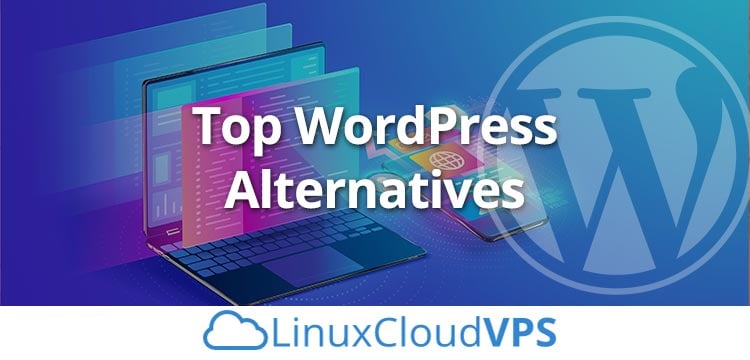One of the popular names in Content Management System (CMS) is WordPress but WordPress is not the only tool available to build and manage your website, there are other more useful alternatives available in the market.
WordPress is scalable, powerful but it is also a complex software. Despite it offers the flexibility of customization, a wide range of themes and plugins, there are some disadvantages. If you are not technically sound, you will run into problems during the installation of WordPress and at some point, you may feel the need for hiring a developer for security checks and maintenance of your WordPress site. In order to avoid such situations, the article offers you a list of alternative tools.
Joomla
For building a large-scale or complex site, one of the most popular WordPress alternatives is Joomla, It is a free and open-source CMS. It offers a flexible interface, an instinctive menu-building system, and lots of great Search Engine Optimization (SEO) tools. Joomla offers a wide range of plugins and extensions which can be used to enhance the functionality of the website. Another advantage of Joomla is that it has a built-in cache management feature which gives it speed and performance. It has a dedicated messenger functionality to enhance collaboration and website security is also taken care of.
The platform offers control and administration feature over content workflows and template layouts in a similar way as WordPress themes. Another great feature offered by Joomla is built-in ALC (Access Control List) that ease out the process of site administration and access permission. Joomla also offers explicit 15 custom field types, which let you build specific kinds of content for your website.
Django CMS
Django CMS is a free and enterprise-level Content Management System used by thousands of websites since 2007. It is a high-level Python Web development framework that encourages rapid development and clean, pragmatic design. It is specially designed for developers to build secure, scalable, and maintainable web applications. It is maintained by the Django Software Foundation and used by many organizations including, Instagram, Discuss, Pinterest, and Mozilla.
Features
- Free and Open-source
- Simple but powerful URL system
- A supportive developers community
- Highly scalable with expandable features
- Built-in webserver and authentication system
- Built-in template system
- Rich Content and Media Support
- Configurable page layout
- Support multiple languages
- Flexible Plugin Architecture
- Support Multisites
Pimcore
Pimcore is a free, open-source, and user-friendly content management system with security and personalization in mind. It is written in PHP and based on the Zend Framework. It combines Product Information Management (PIM), Master Data Management (MDM), Content Management (CMS), and eCommerce. It is specially designed for ease of use and allow business owners to collaborate engaging experiences with the customer. It allows you to create and manage digital experiences for various output channels like web, mobiles, apps, print, social platform, etc.
Features
- Web Content Management
- Multi-channel Delivery
- Multi-channel Delivery
- Workflow Management
- Modern and Intuitive UI
- Multi language and Multi domain support
- Extensible and huge Symfony Community
- Integrated PIM Module
Ghost
Ghost is a free, open-source, and one of the most popular content management systems around the world. It is a simple, lightweight, and headless CMS with Node.js REST APIs. It is written in JavaScript and simplifies the process of online publishing for individual bloggers. It uses a JSON-based document storage format named MobileDoc to store all contents.
Ghost is a straightforward platform and purely used for blogs. It uses Markdown for editing but you can change it using the extension. It comes in two variants, a self-hosted version that is free to use and a hosted version on Ghost’s server.
Features
- Open-source and lightweight
- Search engine optimization
- Subscriptions by RSS, Email and Slack
- Accelerated Mobile Pages
- Simple, powerful theming with Handlebars
- Team Management
- Content ownership
- Support multiple languages
Typo3
Typo3 is a free, open-source, and PHP-based content management system that can be used to create, manage, and output any kind of digital content. It is fully featured, reliable, and used to build websites for small sites to multinational corporations. It is available in more than 50 languages and adds new functions without writing any code. It can run on several operating systems including, Windows, Linux, FreeBSD, and macOS.
Features
- Free, open-source and self-hosted
- Supports Multiple Languages
- Mobile friendly out of the box
- CDN Support
- Multisite Support
- Built-in export and import for sites
- Secure, Performant, Scalable
- Advanced front-end editing
- Open, Extensible and Customizable
Conclusion WordPress is definitely a good platform but only for those who have fairly good technical knowledge. For beginners, they can choose from alternatives listed above as all service providers offer a wide range of advantages. One must keep in mind choosing the right website provider in the first place because once the website is up, then it will be really difficult to switch. We can isntall optimize and migrate any of the CMS above if you are one of our Linux Cloud VPS Hosting client, in which case you can simply ask our system admin to install or configure any CMS.





